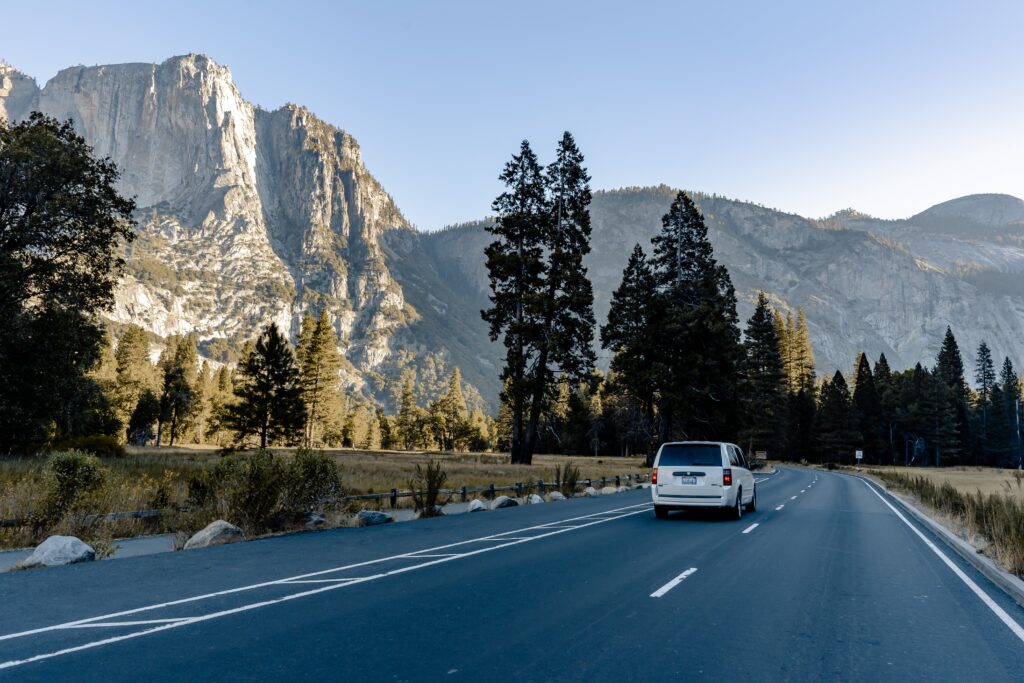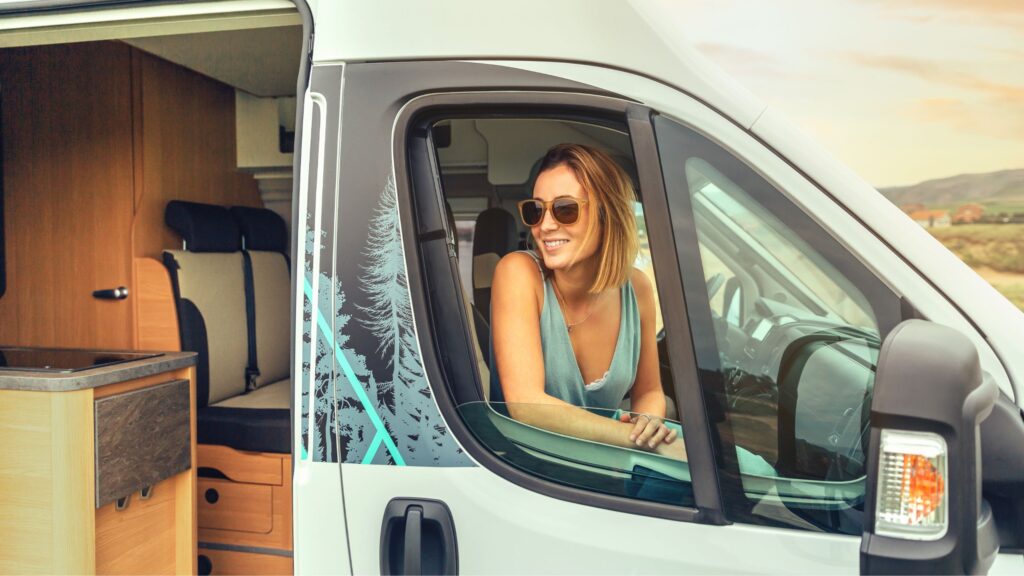Campervan insurance has been a question topic among builders, renters, and owners for years now. With the growing popularity of van life, it might even be renamed to van life insurance one of these years.
There are an overwhelming number of insurance agencies to choose from, and knowing which campervan insurance is right for you can be daunting.
When shopping for insurance for your campervan, choosing the right insurance carrier is crucial in the van life journey. Unexpected incidents happen on and off the road, and you want to make sure your home on wheels is well covered.
Table of Contents
- What Does Campervan Insurance (Generally) Cover?
- How Much Does Campervan Insurance Cost?
- Top Campervan Insurance Providers
- Insurance Providers for DIY Builds
- Large Carrier Insurance Providers
- Small Carrier Insurance Providers
- How to Qualify for Campervan Insurance
- Which Campervan Insurance Is Right for You?
What Does Campervan Insurance (Generally) Cover?
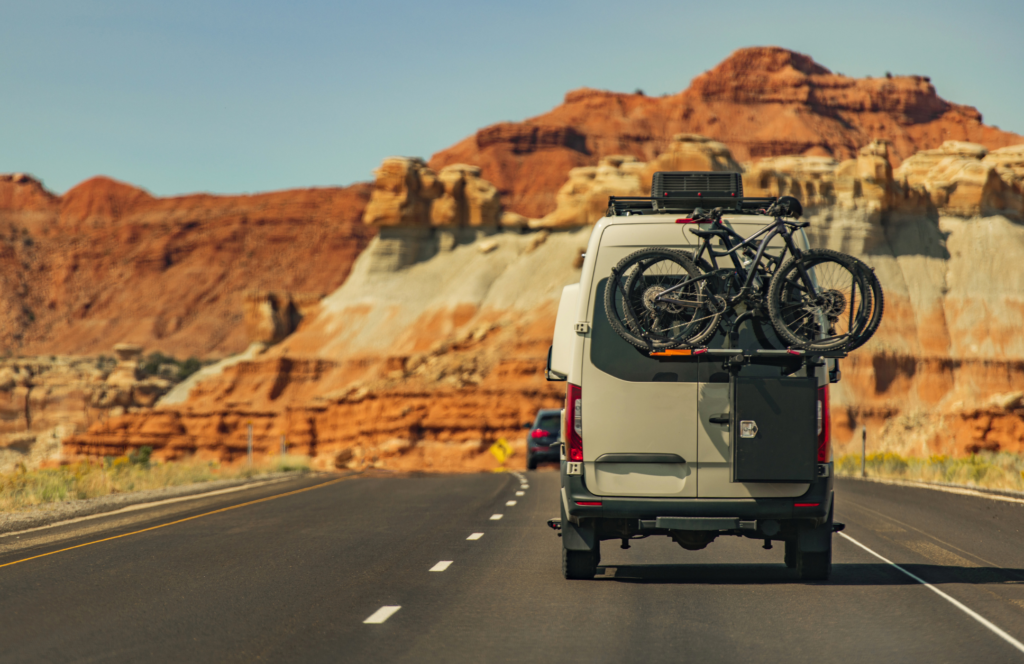
Coverage varies by individual needs and how your insurance carrier classifies your campervan.
Some people decide to title, register, and insure their converted campervan as a normal van to save money. In the event of an accident, the vehicle’s value is considered at the current market rate for that vehicle. Any damages to upgrades or modifications are not considered or covered.
A safer option is to have your converted campervan appraised by a certified appraiser. The appraiser will tour your van, take photos and review all receipts and the build process, taking into account upgrades and modifications. This appraisal gives your insurance company the information needed to insure your van for the actual value, regardless of the market value. Some insurance companies may not require a certified appraisal and will review photos and receipts themselves to determine the value of the vehicle.
Personal items in your campervan should also be covered in case of a break-in or other damage. Similar to renters or homeowners insurance, a campervan insurance policy can cover things like laptops, camera gear, and other items of value kept in your campervan or RV.
How Much Does Campervan Insurance Cost?
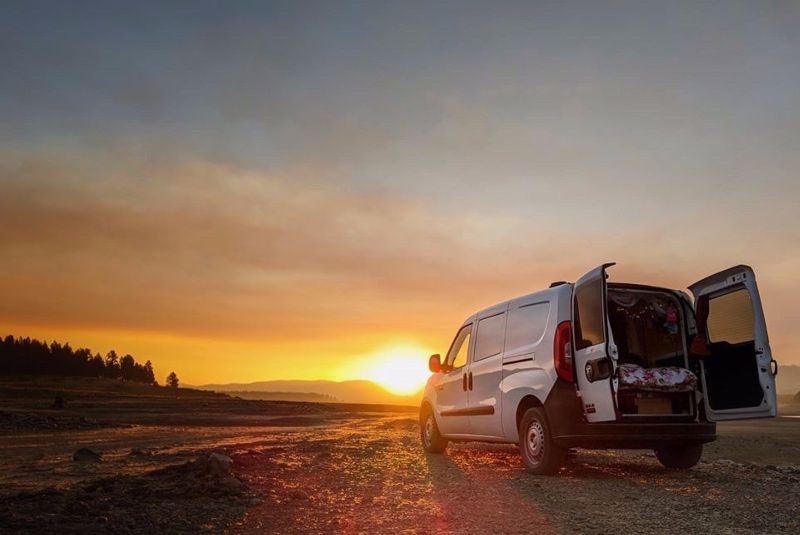
Unfortunately, We don’t have the exact answer to the question, “How much does campervan insurance cost.” The cost of camper van insurance varies significantly depending on the following:
- Value of the recreational vehicle
- How often you will drive it
- Mileage
- Your driving record
- Your age and gender
Don’t be surprised if your campervan insurance quote is more expensive than a regular vehicle. Just how much more will depend on the above variables.
One thing that can greatly affect your insurance premium is your deductible. If you opt for a higher deductible, your premiums will be lower. If you don’t keep money in savings for emergencies, that high deductible may come as a shock if you ever need repairs. Many people opt out of repairs when they learn of the deductible and end up driving an unsafe vehicle.
Always understand your premium and deductible cost. If it’s easier for you to have a higher premium and the peace of mind of a low deductible, choose that. If you keep savings and will be able to pay the higher deductible, it might be more cost-effective to have a lower premium. Then you only pay the deductible if needed.
Top Campervan Insurance Providers
DIY Builds
The most complex and challenging campervan insurance to acquire is for DIY builds, vehicles with aftermarket upgrades, and other non-standard modifications. It’s understandable because these non-traditional vehicles have such a variety of custom amenities that it’s difficult to understand the true value of the vehicle.
An older cargo van may have a market value of only a few thousand dollars. But with mechanical and interior modifications, it could be worth fifty thousand dollars or more.
So how do you get converted campervan insurance that aligns with the actual value of the van and the interior upgrades?
Most importantly, you must document every single upgrade that you do to your DIY build. This includes taking photographs and videos of your build process and keeping every single receipt. If possible, report all mechanical work to Carfax, or at the very least keep an up-to-date spreadsheet of every repair, upgrade, and all maintenance work.
You should also track the time that you put into the build as a part of the overall value.
Some states require that your title’s vehicle classification matches the category you are getting converted campervan insurance under. Changing your title from a passenger van or cargo van to a recreational vehicle is typically a simple process. You will need to check with your state vehicle licensing office for specifics if your insurance company is requesting this.
Insurance Providers for DIY Builds
We are excited to spotlight a newer class B campervan insurance company on the scene, Roamly.
Roamly specializes in better RV insurance that caters to you. Their representatives are familiar with insuring recreational vehicles, so there won’t be any surprise asks when your policy is sent to underwriting for review.
Roamly is also unique because rental coverage is automatically available for anyone who is insured through Roamly. They offer coverage nationwide, as well as in Canada. Keep an eye on them as they change the campervan insurance game!
State Farm Insurance has also been known to provide DIY converted campervan insurance to road travelers!

Large Carriers
Large insurance carriers like Allstate, Geico, and Progressive, offer recreational vehicle insurance for those who travel part-time. Some policies are flexible allowing you to pause full liability coverage when your RV or campervan is not in use. This can save you a significant amount of money when you aren’t using your campervan!
Large carriers often do not provide insurance coverage for your RV or campervan if it is a DIY build or if you live in it full time. But, there have been reports of DIY van builders having success with State Farm Insurance–it may be worth checking out.
Larger Carrier Providers
Small or Private
There are hundreds of local, smaller, or private insurance companies for class B cambervans in everyone’s home state. These companies can be cheaper and easier to work with, but may not offer as comprehensive or flexible coverages as the large national insurance carriers. If you just need a basic policy with minimum coverage, this may be a good route to go.
Small or Private Providers
Rental
If you plan on renting out your campervan or recreational vehicle, your insurance company needs to know. Special coverage is needed for a vehicle to be covered when someone other than the owner is driving it.
Rental platforms like Outdoorsy, RVezy, and GoCamp have made this easy by offering this insurance when your vehicle is rented through their services. Regardless of whether the renter has their own insurance, you must have additional renters insurance for your campervan or RV for your own and the renters’ safety.
How to Qualify for Campervan Insurance
There’s a lot that goes into qualifying for campervan insurance. Each insurance company and state have different requirements. The most common requirements needed to qualify for RV or converted campervan insurance are having certain items on board.
Items Required to Qualify for Campervan Insurance
- Toilet (this can be as simple as a porta-potty)
- Refrigerator (typically, the requirement is “permanent,” or at least bolted down)
- Cookstove (also typically required to be permanent or bolted down)
Check with an insurance company in the same state where you will be registering your van before you purchase a campervan or start your own build. This will help you determine the requirements necessary to have coverage for your van.
Our Top Pick: Roamly - Best Campervan Insurance Overall
Why Roamly is the Best Campervan Insurance: Explore VanX Owner Shares His Experience
David Lewis is the Owner and Founder of Explore VanX. He “lived the van life” for years, so he understands all the nuances of not only living in a campervan full-time, but also how to handle things like insurance and roadside assistance.
This is such a hot topic for those starting their own van life journey that we pulled together the top questions we’ve received from readers on our site and asked David to answer them for us, based on his experience.
Read on to learn more about campervan insurance and roadside assistance for life on the road!
What kind of RV/Campervan do you have?
When I first started van life, I purchased an unconverted van out west and ended up insuring the chassis through State Farm for $158/mo. I also used Progressive for a while until they got too expensive.
Since then, I’ve owned an ‘88 Chevy G20, a 2016 Ford Transit, and a 2022 Ford Transit high roof dually extended (yep, it’s a beast!).
What is the best insurance for a campervan?
Prior to Roamly, I used State Farm and Progressive alongside AAA. When Roamly came on the scene, it was a breath of fresh air. Finally, an insurance company that understands those of us who use our campervans and RVs daily and how we need them insured!
Roamly is truly tailored to full-time van lifers and RVers – they allow you to live in your rig full-time and have insurance that covers odd catastrophic things that can happen when you’re in a rig full-time without a home base nearby. They truly are the best insurance for campervans and RVs.
How did you hear about Roamly?
Through Explore VanX, I met many people and talked to a lot of businesses. I learned about Roamly through Outdoorsy because they actually own Roamly! (It makes sense, right?) With as many campervans and RVs as they rent out, they must know what they are doing.
What’s the difference between Roamly and AAA?
Roamly provides full coverage insurance for your campervan or RV. This provides you with collision, liability, and comprehensive coverage. They also have optional add-ons, including roadside assistance and hotel reimbursement if you have a breakdown.
AAA is roadside assistance only. (They do have regular vehicle insurance but don’t cover campervans for full-time users) It’s the best $100 per year I have ever spent as a vanlifer, and any other vanlifer who has it will tell you the same thing. I’ve had a platinum membership for 11 years, and it’s paid for itself many times. The best feature is the free 200-mile tow you can use once a year. C’mon, it’s van life… you’re gonna break down at some point…
Roamly also has roadside assistance, which I opted for because I can’t imagine it would hurt to have two options to utilize when needed.
Is there a benefit to double-insuring?
I don’t know if there’s a true benefit other than my peace of mind. But after 11 happy years with AAA, I wasn’t ready to find out, so I decided to keep both Roamly’s and AAA’s roadside assistance.
Are there limitations to using Roamly and/or AAA?
With Roamly, they will not cover rigs over 15-20 years old, depending on the state the vehicle is registered in. The best way to find out if your campervan or RV qualifies is to go online and request a free quote.
AAA doesn’t have any limitations. Pay your annual membership fee, and you’ll have roadside assistance. They also offer a lot of perks with their membership. Once, I was able to use a trip reimbursement perk when my campervan broke down, and had to stay at the mechanic for a few days.
What if you break down on a forest service road?
This is every vanlifer’s nightmare – having roadside assistance but being in a location where someone won’t come help you! And yes, this happens often. Interestingly, this is more determined by the tow company than the insurance company. This is another reason you might want to be dual-insured; you can expand your network and possibly your chances of getting towed out of a not-so-desirable location.
If you plan on going to an area where there’s a good chance you might get stuck, it might be a good idea to check with local tow companies to see if they service the area you’re headed to. Many local Facebook groups are also dedicated to supporting fellow overlanders when they get in sticky situations.
Do your research before going deep into forest service roads, and at the bare minimum, ensure you tell someone where you’re headed so they know where to look if you get stuck.
How fast is the approval process with Roamly?
Fast! I requested a free quote and received a phone call within a few hours. They asked for some photos and the value of my rig(s), and I got a quote right then and there. It took a few days to finalize everything, but otherwise, the initial approval process was fast and easy.
Roamly doesn’t require that you have an appraisal to get you a quote or insure you, but I highly recommend you have one. This will help with any pushback if you ever need to file a claim and ensure you receive fair compensation for the true value of your campervan or RV.
How much does Roamly / AAA cost?
AAA is only $100/year. One tow a few miles down a road can cost hundreds of dollars, so to me, this is a no-brainer.
Roamly has no hidden costs, and they even allow you to rent out your rig under their insurance plans! I’m currently paying $128/mo for both of my campervans.
Can you live in your campervan full-time and still be fully insured?
Roamly is the first insurance company to openly state that you can live in your campervan or RV full-time while using their insurance coverage. Most other companies only allow part-time recreational use of your rig.
AAA’s roadside assistance is just that – it doesn’t matter if you live in the vehicle or not.
Does Roamly offer other perks with their insurance?
Yes! You can insure one vehicle or an entire fleet, and you’ll receive a discount if you insure multiple campervans or RVs.
You can also insure DIY campervan builds and even rent out your campervan without having to get additional insurance coverage.
They offer windshield protection, tire and wheel protection, roadside assistance, and various other perks.
If you’re curious if Roamly will save you money and cover your campervan or RV, get a free quote today and find out!
Which Campervan Insurance Is Right for You?
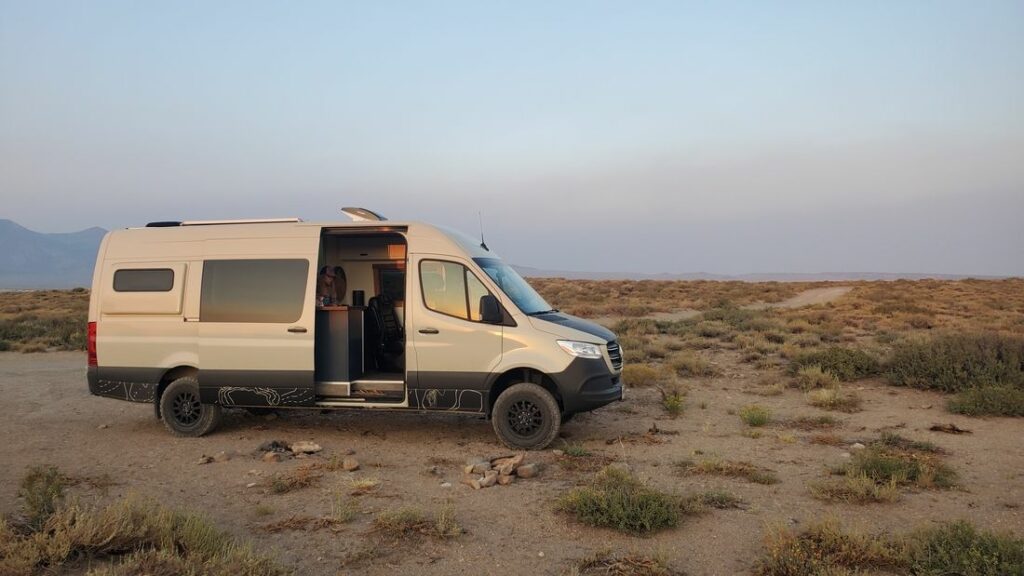
It can be a daunting task to decide on an insurance carrier. Luckily Explore VanX has curated an extensive directory of insurance carriers. Follow these four easy steps to review carriers and find what campervan insurance is right for you!
- Click the “Insurance & Loans” tab in the top menu
- Select your region or state from the drop-down menu on the left
- Cruise through campervan insurance company listings
- Click on the title of an insurance company to view their profile OR click “go to website” to head directly to their site
If you have any questions or comments, please email us at sales@explorevanx.com.



